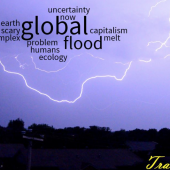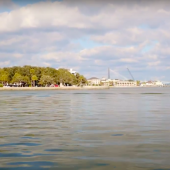
Abstract: The experience and impacts of climate change are uneven across generations, income classes, cultural groups, and geographical locations. Efforts to document and understand such experiences and related perspectives are increasing. Particularly among student groups, there is much attention on understanding how children and teenagers perceive climate change. However, until now, such perspectives of graduate students have not been represented in the literature. We, thus, surveyed and spoke with graduate students from a Geography, Planning and Environment Program at Concordia University in Montreal / Tiohtià:ke, Quebec, Canada. As a sample of next-generation decision makers, they shared fears, concerns, and recommendations consisting of both bio-physical and socio-political scientific dimensions. They expressed interdisciplinary perspectives related to climate change vulnerability, mitigation, and adaptation as they relate to water and extreme weather. Their fears included uncertainties pertaining to climate and human behaviors, and the possibility of surpassing global carrying capacities that could result in irreversible and lethal disasters. Considerations involved recognizing the vulnerability of the climate system and of humans, with a focus on socio-political injustices. Students placed a strong focus on emerging opportunities, such as fostering community development and investing in innovative technologies. They recommended power shifts, through paradigm awareness and reformed policies, where currently vulnerable populations access more decision-making power. They suggested fostering interdisciplinary and international cooperation to integrate climate science, involving age-appropriate modelling programs, into school curricula, and learning about human positionality and from resilient populations. We consider wicked problems, psychological distancing, and climate literacy as influential concerns in shaping climate change contexts and literacy. Our methodology allowed research participants to guide the study’s questions and foci with the use of a survey, collectively-generated word collages, and a focus group. The activities prompted space for the group to practice roleplaying as decision makers. As gentle form of Participatory Action Research, the methods could guide other groups to reflect upon and document their perspectives.
Continue ReadingAbstract: While it is widely recognized that effectively addressing climate change requires a drastic reduction in carbon emissions, we nonetheless find ourselves in an impasse, unable to imagine nor bring about a post-carbon future. This is, in part, because climate change is not only a technological problem, but also a philosophical, cultural, and aesthetic problem—an existential crisis of thinking, or perhaps unthinking. To unthink the carbon regime, higher education must forge new thought models and educational platforms that operate in solidarity across disciplinary scales and territories. This report documents a collaborative course development process for a grant-funded transdisciplinary course entitled: Unthinking Oil: Public Architecture and the Post-Carbon Imaginary. In particular, we discuss a virtual Unthinking Oil Workshop held with students and faculty from a range of disciplines. The workshop provoked broad discussions regarding the role of higher education in addressing the many entanglements between climate change, society, and the built environment.
Continue Reading
Abstract: After 20 plus years as a sustainability educator, the author had one of those lie-awake-at-night-staring-at-the-ceiling experiences where she faced some hard questions about the state of the world. In this article, describes her subsequent journey investigating the role of listening in shifting to a life-sustaining society and her Ph.D. research into how to support listening across differences to address complex social-ecological challenges.
Continue Reading
What if a river or a creek were to tell us its story? In this short film and interview, we offer a glimpse into the ecological philosophy guiding our efforts to create “more sustainable ways of living with water and how to appreciate its capacities to support all life.”
Continue ReadingAbstract: In 2008 astronauts aboard the International Space Station captured an image of sunlight as it passed through the Earth’s thin atmosphere, described as the thin blue line of “all that stands between life on Earth and the cold, dark void of space.” At the center of sustainability education is a discourse of climate change and life’s demise on the planet. In this short article, the contributing role of the United Nations University’s Regional Centres of Expertise (RCEs) for sustainability education is explored with respect to community-based climate change adaptation, notably through RCE Dhaka (Bangladesh) as an example of the challenges and opportunities for climate change adaptation in one of the most heavily populated megacities of the Global South.
Continue Reading